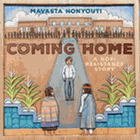
Hopi master woodcarver and middle-school teacher Mavasta Honyouti pays loving tribute to his grandfather (kwa'a) in the biographical picture book Coming Home. The text appears in both English and the Hopi language, Hopilavayi, translated by Marilyn Parra, while the exquisite illustrations are cottonwood root carvings painted with acrylic. The combination powerfully envelops readers in Hopi culture.
Honyouti's kwa'a experiences the trauma of family separation when the U.S. government abducts him and the other children of his village and forces them into federal boarding schools: "All of [the children] were gathered in a large room. Some they sent to get their hair cut, while others were brought to a room where they were plunged into a smelly fluid." The children were further dehumanized by being made to change their clothes and take new names. Honyouti's grandfather's Hopi name, Honkuku, is recorded as Honyouti, resulting in his family name being changed. Honkuku unsuccessfully tries to run away from the school multiple times, until he is finally released. When the young man returns home, he chooses to raise a family and live the life of a farmer, holding tight to his identity despite the government's efforts to eradicate it.
Honyouti includes notes about his illustrations and the Hopi translation in the book's back matter. His admiration for his kwa'a is evident on every page; his magnificent wood carvings add to the atmosphere of the book and pay homage to the art Honkuku taught his sons. The wood carvings' gentle earth tones and striking textures evoke cultural elements and deliver strong emotion. --Jen Forbus, freelancer

